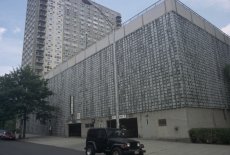 Massive parking garages on Hudson St. serve to deaden the streetscape and contradict Hoboken’s scale. Stevens’ proposed garage would have a similar impact on Hoboken’s waterfront.
Massive parking garages on Hudson St. serve to deaden the streetscape and contradict Hoboken’s scale. Stevens’ proposed garage would have a similar impact on Hoboken’s waterfront.(March 2006)
On May 17, 2005, Appellate Court Judges Howard Kestin and Steven Lefelt heard oral arguments in the case of Township of North Brunswick vs. North Brunswick Board of Adjustment. A month later on June 23, 2005, Judge Lefelt wrote a landmark decision that overturned the Board of Adjustment approval that granted multiple variances for height, density and use for a luxury apartment complex. On March 14, eight months later, the same Judges, Kestin and Lefelt, heard arguments in the case of Fund for a Better Waterfront vs. the Hoboken Zoning Board of Adjustment. The cases are similar in that wholesale variances were granted by the Board in each case, including variances that substantially altered the intent of the zoning ordinances.
At the March 14 oral arguments before the Appellate Court, attorney Michael Garofalo, representing FBW, explained that the City of Hoboken had created the R-1(E) zoning specifically for Stevens Institute of Technology just a few years earlier. Garofalo argued that it was not just the number of variances granted but also the significant nature of many of these variances that cause this to be a case of de facto rezoning. In other words, the Zoning Board substituted its judgment for that of the City Council which has the sole authority to amend and create a zone plan for the city.
Attorney Timothy O’Neill, on behalf of defendant Stevens Institute of Technology, argued erroneously that the variances granted were for zoning regulations that applied beyond the confines of the R-1(E) zoning subdistrict. Judge Kestin asked several pointed questions of O’Neill. At one point, the Judge asked if Stevens would be able to request variances for a project simply because the project fulfills a need of the institution, thus making the Hoboken Zoning Ordinance irrelevant.
In the Township of North Brunswick case, the Court reversed the Zoning Board approvals stating, “The Board’s action . . . blatantly rejected the Township’s zoning plan and improperly arrogated to itself the power to substitute its idea of an appropriate zone plan.” In the Hoboken case, on August 24, 2004, the Board granted to Stevens Institute of Technology some 18 variances that grossly exceeded use, height and bulk standards of the Hoboken Zoning Ordinance. In his brief, FBW attorney Michael Garofalo of Laddey Clark & Ryan relied heavily on Township v. Zoning Bd. of Adj. 378 N.J. Super. 485 (App. Div. 2005).On June 13, just ten days prior to the Township decision, Superior Court Judge Hector Velazquez upheld the Hoboken Zoning Board’s wholesale granting of these variances.
In its 5 to 2 vote, the Hoboken Zoning Board granted variances for lot depth, lot coverage, front yard setbacks, setbacks from residential zone, building separation, building length, open space, facade treatments, number of buildings per lot, ownership type, retail use requirements and building height. Attorneys representing Stevens made the argument to the Zoning Board and the Court that the garage site comprised a small portion of the R-1(E) zoning subdistrict and this zoning district comprises a small portion of the municipality. But in the Township case, the Court rejected the argument that “no usurpation of municipal authority had occurred because the property at issue did not comprise a significant portion of the R-2 zone or of the Township as a whole . . .” The Court concluded, “Such action, even in a relatively small portion of the district, takes on the appearance of de facto rezoning.”
Elsewhere on the Hoboken waterfront, parking garages must be enclosed behind retail or residential uses, thus ensuring a quality waterfront. Stevens’ proposed 725-car parking garage extends nearly a full city block, 386 feet from Fifth Street to Sixth along Sinatra Drive, directly across from Sinatra Park. Since the garage was first proposed, FBW has contended that it would degrade what potentially could be a world class waterfront. Stevens has already constructed a portion of the garage below the Babbio Center despite the lack of any Planning Board authority to do so.
Stevens Institute and FBW are also before the Appellate Court on another matter. In January of 2003, Stevens Institute filed a defamation lawsuit against FBW, its Executive Director and Board President for statements made about naturally-occurring asbestos being released into the air during the excavation of some 35,000 cubic yards of serpentine rock to make way for the parking garage. Superior Court Judge Camille Kenny threw out the defamation count in July 2004, and in February 2005, Judge Theemling dismissed the final count of last resort, a prima facie tort. Stevens has taken this case to the Appellate level despite consistent rulings by New Jersey’s Appellate and Supreme Courts decided in favor of defendants in defamation cases. Since lawyers representing FBW contend this 3-year old case was frivolous from the start, they are seeking over $1 million in legal fees.
FBW News Archive

